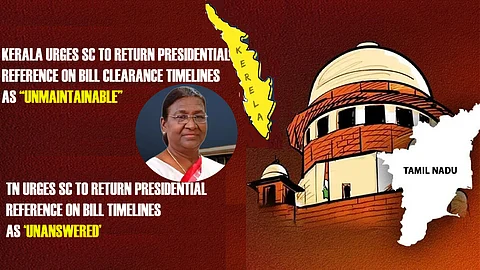

New Delhi | The Supreme Court on Tuesday asked what was wrong if the president herself seeks views through a presidential reference on whether fixed timelines can be imposed on governors and the president for acting on bills passed by state legislatures.
A five judge Constitution bench headed by Chief Justice B R Gavai posed the question when the counsel representing the opposition-ruled Tamil Nadu and Kerala governments questioned the very maintainability of the presidential reference.
The bench also comprised Justices Surya Kant, Vikram Nath, P S Narasimha and A S Chandurkar.
“When the hon'ble president herself is seeking reference then what is the problem ... Are you really serious about contesting this?” the bench asked while beginning a crucial hearing on the reference.
“It is very clear that we are sitting in an advisory jurisdiction,” the bench said.
In May, President Droupadi Murmu exercised powers under Article 143(1) to know from the top court whether judicial orders could impose timelines for the exercise of discretion by the president while dealing with bills passed by state assemblies.
The Centre said in its written submission that imposing fixed timelines on governors and the president to act on bills passed by a state assembly would amount to one organ of the government assuming powers not vested in it by the Constitution, and lead to "constitutional disorder".
Senior advocate K K Venugopal, appearing for the Kerala government, said similar questions regarding Article 200 of the Constitution, which requires governors to act “as soon as possible” on state bills, had already been interpreted by the top court in cases concerning Punjab, Telangana and Tamil Nadu.
Citing several Supreme Court verdicts, he said the governor's powers under Article 200 have been interpreted by the apex court time and again. For the first time, in the Tamil Nadu (State vs Governor) case, has a deadline been fixed for the assent of bills passed by the assembly.
“These issues are no longer res integra (undecided). Once judgments cover the field, a fresh presidential reference cannot be entertained,” he contended, adding that the government of India should have sought a formal review instead of invoking Article 143 to seek a reference by the president.
Venugopal also said the president is bound by the aid and advice of the council of ministers under Article 74, leaving little room for discretion.
“In substance, this is not the president's reference but the government's,” he argued and added that "issues are covered by a series of judgments”.
Senior advocate Abhishek Singhvi, appearing for the Tamil Nadu government, said there cannot be an “intra court appeal directly or indirectly” by filing the reference under Article 143.
"This court is being asked to change the contents and substance of a judgment between two different parties and this is a subversion of institutional integrity... this is an appeal howsoever nicely you camouflage it,” Singhvi said.
Justice Narasimha said, “The adjudicatory decision stands on complete footing rather than advisory.” “Show us one judgment where in a division bench, a reference is not tenable. We are not deciding the issue whether Tamil Nadu is correct or not,” the CJI asked.
At the outset, the CJI said the bench would first examine objections to the maintainability of the reference under Article 143 of the Constitution. Attorney General R Venkataramani opposed the pleas of Venugopal and Singhvi.
The hearing is underway.
On July 22, the top court observed that the issues raised in the presidential reference will affect the "entire country".
On April 8, the apex court delivered a verdict on the powers of the governor in dealing with bills passed by the Tamil Nadu government.
The verdict, for the first time, prescribed that the president should decide on the bills reserved for her consideration by the governor within three months from the date on which such a reference is received.
In a five-page reference, President Murmu posed 14 questions to the Supreme Court and sought to know its opinion on powers of the governor and president under Articles 200 and 201 in dealing with bills passed by the state legislature.
The verdict set a timeline for all governors to act on the bills passed by the state assemblies and ruled that the governor does not possess any discretion in exercise of functions under Article 200 in respect to any bill presented to them and must mandatorily abide by the advice tendered by the council of ministers.
It said state governments can directly approach the Supreme Court if the president withholds assent on a bill sent by a governor for consideration.
